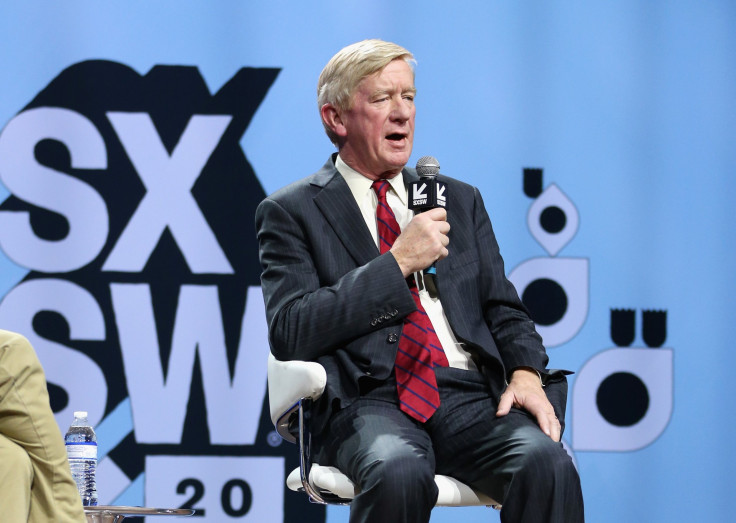Republican Candidate Believes He Can Beat Trump, Win GOP Primaries With Independents' Vote In 2020

Former Massachusetts Gov. William Weld, President Trump’s sole Republican primary opponent, has a strategy he believes can reshape both the dialogue and direction of the 2020 presidential election.
Weld, 73, served as governor from 1991 to 1997. He also was a vice presidential nominee on the Libertarian ticket in 2016 with former New Mexico Gov. Gary Johnson, the first time two former governors formed a presidential ticket since 1948. Prior to entering politics, Weld was a U.S. Attorney for the District of Massachusetts and later Assistant Attorney General of the Criminal Division under Edwin Meese. He resigned in protest from the Justice Department, along with four others, during an ethics scandal and investigation of Meese, who would soon after resigned.
In a campaign stop in Exeter, New Hampshire, over the weekend, Weld told an assembled crowd he is “the most pro-choice person you’re ever going to meet.”
The Republican leader of Vermont, @GovPhilScott, said yesterday that he'd support @GovBillWeld over @realDonaldTrump — and nobody seemed to notice.
— Paul Heintz (@paulheintz) May 17, 2019
From @jwalters7D's story: https://t.co/49eoJUpNAq
“The way I look at it, it’s kind of a power issue. And who wants a lot of big, fat, white guys who live in Washington 700 miles away making the decision about what's going to happen about a family pregnancy where the family has basis for some views and maybe wants to terminate the pregnancy?” he said.
In light of recent heartbeat laws and pending legislation in a number of states to curb abortion and chip away at the 1973 Roe v. Wade Supreme Court ruling that allows it, Weld stands to the left of Trump and much of the Republican party. However, if elected president, he has said he isn’t sure he would make upholding “Roe” a litmus test for Supreme Court nominees.
Weld has criticized the Trump administration for not preparing for the enormous shifts in jobs and job types as technology such as self-driving cars and trucks, robotics, drones and artificial intelligence change the nature of work.
Bill Weld says Trump's inaction on deficit, climate change will hurt millennials the most https://t.co/hvQOjgYtJu #weld2020
— Gov. Bill Weld (@GovBillWeld) May 13, 2019
“We’re just kind of whistling past the graveyard there,” he said.
Weld believes his focus on future jobs, abortion rights and LGBTQ rights will help him win votes in the primary in the 20 states that allow voters to cross over parties. One of those states is New Hampshire, another Massachusetts, and states in the West, such as Oregon, Washington and California.
On the economy, Weld describes himself as a fiscal conservative, with goals of cutting spending and balancing budgets.
Weld's background might serve him well in a presidential race. A graduate of Harvard and Oxford whose ancestors arrived on the Mayflower, Weld began his career legal counsel for the House Judiciary Committee during the Watergate impeachment inquiry of former President Richard Nixon. A colleague at the time was another young lawyer, Hillary Rodham.
Weld made an unsuccessful bid for Massachusetts Attorney General as a Republican in 1978, losing to incumbent Democrat Frances X. Belloti, 78.4% to 21.6%. In 1981, then-Associate Attorney General Rudy Giuliani recommended Weld to President Ronald Reagan for appointment as U.S. Attorney for Massachusetts. He held that post for five years, during which he expanded a corruption investigation into the administration of Boston Mayor Kevin White that resulted in the indictment of more than 20 city employees. Weld gained national recognition after winning 109 of 111 public corruption cases, an achievement The Boston Globe called “unparalleled in the various federal jurisdictions.”
Weld told the New York Times in April, shortly after announcing his dark horse run against an incumbent, that he believes there are still enough Republicans and Independents that find Trump objectionable enough to deny him a second term. Comparing Trump missteps to those of Nixon that led to the latter’s resignation in advance of impeachment, Weld talked about what’s called the Take Care Clause.
When a president takes the oath of office, he pledges to uphold the Constitution and to take care that laws are faithfully executed. Nixon violated the Take Care Clause when he ordered White House staff to bury the Watergate investigation.
Nixon committed one violation of the Take Care Clause, but Trump has done dozens of the things that violate his pledge to take care that laws are faithfully executed, Weld said.
Bill Weld: "Donald J. Trump, candidly, he looks like he would he would rather be a king than a president who had to work to earn and preserve the trust of the American people." https://t.co/XPS5Qaq72G pic.twitter.com/PPLENIN0V7
— The Hill (@thehill) May 12, 2019
Weld plans a campaign swing through western states next month. Earlier this year, Weld told Bloomberg News he can beat Trump with help from independent voters. He accused Trump on CNN the same weekend of “showing contempt for the American people.”
© Copyright IBTimes 2025. All rights reserved.





















